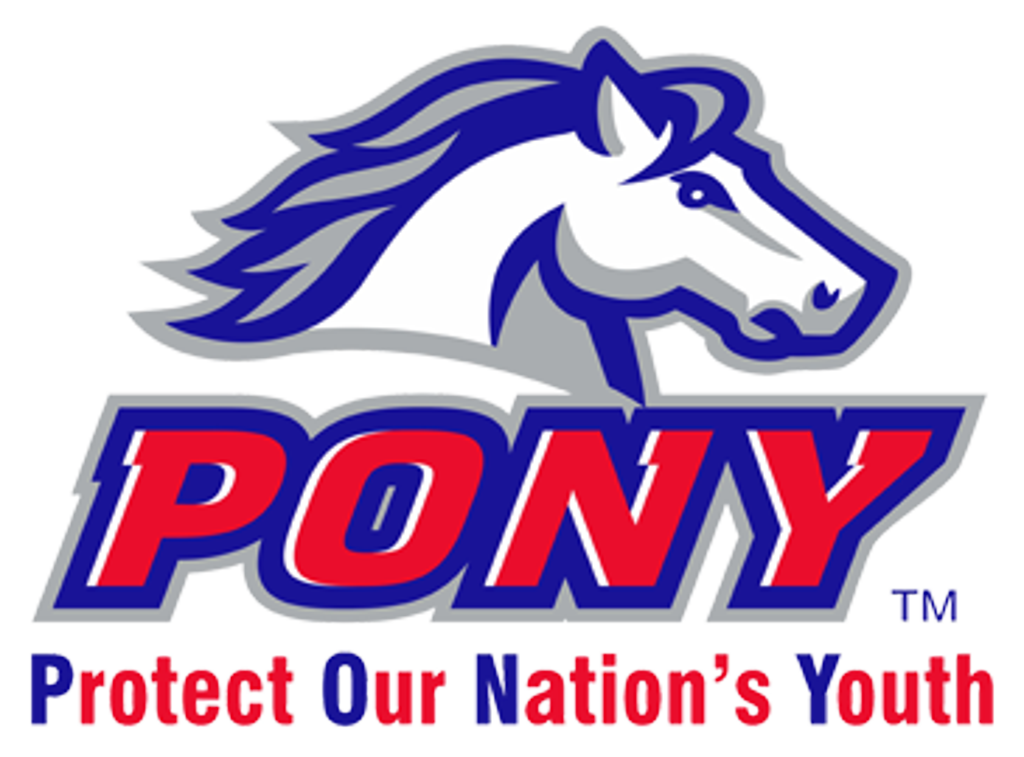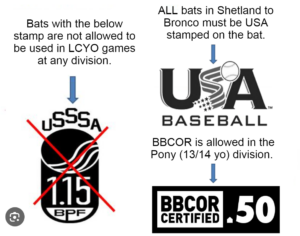
Baseball
LCYO is affiliated with Pony Baseball. We run five age divisions: Shetland/Tball (League Age 5-6 yrs old), Pinto (League Age 7-8 yrs old), Mustang (League Age 9-10 yrs old), Bronco (League Age 11-12 yrs old) and Pony (League Age 13-14 yrs old)
Years Eligible (2024 Fall and 2025 Spring Season)
Shetland/T-Ball - Players Born Between 5.01.18 - 4.30.20
Pinto Division - Players Born Between 5.01.16 - 4.30.18
Mustang Division - Players Born Between 5.01.14 - 4.30.16
Bronco Division - Players Born Between 5.01.12 - 4.30.14
Pony Division - Players Born Between 5.01.10 - 4.30.12

LCYO REAL BASEBALL. REAL FUN.
LCYO plays PONY baseball. PONY started as an organization to provide baseball for boys who had "graduated" from Little League at the age of 12. This covered players from ages 13 up to 18. Over time, PONY (Protect Our Nation's Youth) branched out into softball and baseball for players younger than 13. PONY implemented a graduated system of fields, making them proportional to the players' size. Just as no one would expect a seven year-old to put on a uniform made for a 12 year-old, neither should we expect kids of various ages to play on one size of diamond. It is far more logical to tailor a diamond to match the physical capability of the children as they develop. Hence, T-Ball )5-6) and Pinto (7-8) players use 50-foot base paths, Mustang (9-10) 60 foot, Bronco (11-12) 70 foot, Pony (13-14) 80 foot, and Colt (15-16) and Palomino (17-18) 90 foot. Note that for Little League, the players need to jump directly from 60 feet to 80 feet in one season when they switch to Pony baseball. Pitching distances are also graduated according to field size.
Another enhancement that PONY offers is the introduction of real baseball rules earlier in the child's playing career. For example, starting at age 11 in Bronco, players can lead off and steal bases at any time, pitchers learn the rules regarding balks, and batters can advance to first on a dropped third strike. Introducing these key rules of real baseball make the game more fun for both players and spectators.
Not permitting the runner to lead-off and steal bases, according to real baseball, means that the youngsters are playing, being taught, and learning only a part of the game of baseball. Base stealing, even the threat of base stealing, is a major part of the game of baseball. The by-play between the runner and the pitcher, between the runner and the shortstop and second baseman, are being omitted.
Base stealing means the infielder must adjust for the runner, covering his bag as well as his normal fielding position. It means the pitcher must concentrate on the runner as well as the batter. It means the catcher must hold the ball, learn to throw better and in essence, really learn to catch. It means a runner must think, bluff, challenge the pitcher and catcher, and learn to slide. The pitcher who is a good pitcher only because of the ability to throw hard will no longer overwhelm the opposition with brute power alone.
The pitcher can no longer ignore any player who gets a walk, but must split concentration between batter and runner. With base stealing permitted, the runner becomes a threat, and the batter has a chance against the pitcher. The player who pitches must become a pitcher, not just a thrower. The fast player who does not hit big has a far greater chance to make the team. As a runner who can become a threat by stealing and threatening to steal bases, such a player may be as much help to a ball club as a bigger player. Special talents, at last, can be put to use.
The players themselves are better equipped to play in older age leagues, having had the experience of playing the complete game of baseball.
SHETLAND
The Shetland/T-Ball division is one of the largest and most important divisions in Pony Baseball. The focus in T-Ball is on developing basic baseball skills, introducing sportsmanship, cooperation, and most of all HAVING FUN!! No score is kept; the emphasis is on learning not winning. Click here for more.

SHETLAND
Director
PINTO
This division is known for exciting, action-filled games and noticeable improvement in skills by its players. Our goal for our young players at this level is to develop a strong foundation in the principles of sportsmanship and teamwork, and most importantly, having fun learning to play baseball. Click here to more.

PINTO
Director
MUSTANG
The Mustang division is an important step in your child’s understanding of baseball and development of skills. In this division the players will begin playing traditional baseball, with live pitching, base stealing, bunting and all the related offensive and defensive strategies. Click here for more.

MUSTANG
Director
BRONCO
The Bronco Division (ages 11 and 12) is perhaps the first level in the LCYO youth baseball system in which the players participate in “complete” baseball; including all of the traditional baseball rules, strategies, guidelines, etc. The Bronco Division follows PONY baseball rules which include base runner leadoffs at all bases, base stealing, pitching from the “stretch” position, balks, dropped third strike, the infield fly rule, and all other rules and procedures which normally govern the game of baseball. Click here for more.

BRONCO
Director
PONY
The LCYO Pony Division provides an opportunity for 13 & 14-year-old boys to play competitive baseball in an atmosphere that fosters and supports the recreational attitude of the La Costa Youth Organization. Pony Division baseball is virtually real baseball. We use real baseball rules and equipment with only a few minor modifications. Click here for more.

PONY
Director






